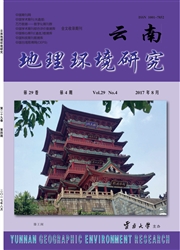

 中文摘要:
中文摘要:
生态效率可以度量城镇化过程中的资源环境成本,因此城镇化、经济发展、资源环境3者关系可转变为城镇化率与生态效率之间的关系。在国家层面、区域层面对中国城镇化水平和生态效率进行历时性与共时性两方面研究。从时间方面来看,1952~2012年,中国整体城镇化率与生态效率呈显著正相关;1949~1957年,中国城镇化率与生态效率呈负相关;1958—1977年,城镇化率与生态效率二者没有相关性;改革开放后,中国城镇化率与生态效率呈显著正相关。从空间方面来看,大部分省份2002—2012年的城镇化率与生态效率呈显著正相关,城镇化率越高的区域其生态效率越好,城镇化率越低的区域其生态效率越差;但东北地区例外,可能是计划经济影响和产业结构原因导致。从生产总量和生产结构两个方面进行分析均表明城镇化对经济增长和资源消耗增大都有影响,但城镇化对经济增长的影响速率快于对资源消耗的影响速率,从而促进了生态效率的改善。
 英文摘要:
英文摘要:
Ecological efficiency could measure the environmental cost which was produced during the urbaniza- tion, thus the relationship of urbanization, economic development, resource and environment could be turned in- to the the relationship of urbanization rate and ecological efficiency. The urbanization rate and ecological efficiency are studied by means of integrating diachronic study with synchronic study from the national level and the regional level. From the aspect of time, there is a significant positive relation between the overall urbanization of China and ecological efficiency from 1952 to 2012. Specifically, from 1949 to 1957, urbanization rate of China and ecologi- cal efficiency presents negative correlation; from 1958 to 1977, there is no correlation between them; after the reform and opening up policy, they shows significant positive correlation. From the spatial perspective, there is a strong positive relation between the urbanization rate of most provinces and its ecological efficiency from 2002 to 2012. And the higher rate of urbanization of an area, the higher ecological efficiency of this area while the lower rate of urbanization comes with the lower ecological efficiency with the exception of the northeast of China, which may result from the planed economy and industry structures. The urbanization has a great impact on the eco- nomic growth and resource consumption based on the analysis of overall production and its structures. The rate of economic growth caused by the urbanization is faster than the rate of consumption caused by the urbanization, thus getting the ecological efficiency promoted.
 同期刊论文项目
同期刊论文项目
 同项目期刊论文
同项目期刊论文
 期刊信息
期刊信息
